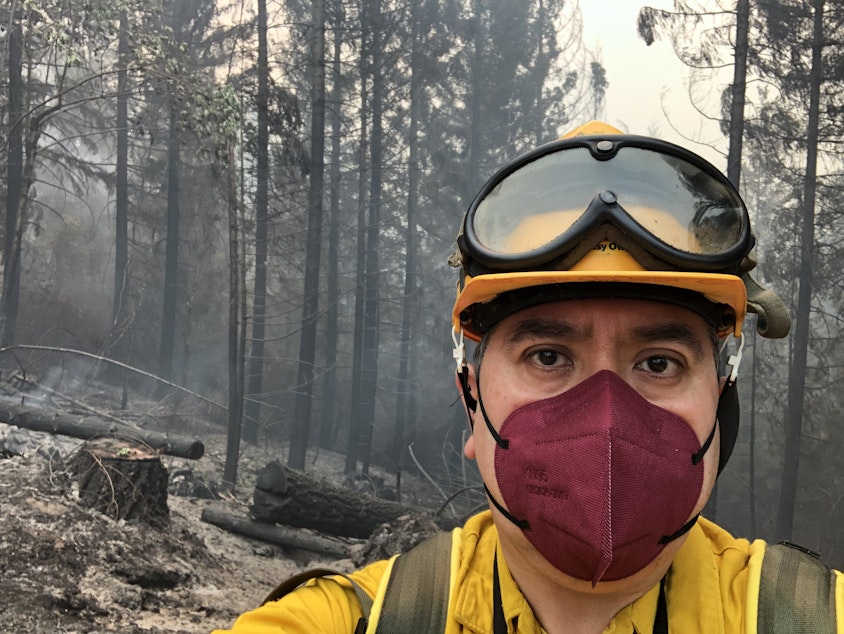'Gray skies and that dull orange orb in the sky': The view from NW fire lines

Thousands of firefighters are on the ground in our region, trying to control wildfires that have already consumed hundreds of thousands of acres.
They battle raging flames, haze that affects their visibility and air quality, and now, spiking Covid-19 cases.
KLCC reporter Brian Bull has been entrenched with the men and women on the fire lines in the Pacific Northwest this season.
Bull describes the scene from his home in Eugene, Oregon, as the Holiday Farm Fire ravaged Blue River last year.
"This [hazy orange, gray-ish] fog just kind of surrounded the entire valley. And when the rains finally came and cleared out the sky - I could see blue sky again — I almost just cried," he recalls. "To this day, I still occasionally have waking nightmares about those grays skies and that dull orange orb in the sky. It was just really unsettling."
Brian Bull
"You oftentimes ask yourself, you know: When is it going to be my turn to see my community rendered to ashes?"
Bull says he was trained as a wildland firefighter — "30 years and about 50 pounds ago." When he suits up for the fire line today, as a journalist, he looks much like one of the firefighters he reports on: loaded with fire-resistant pants and shirts, heavy boots, thick gloves, a helmet and an emergency fire shelter ready for the worst-case scenario.
Sponsored
As difficult as it is to spend even a short time on the lines, it's nothing compared to what firefighters face day in and day out.
"The firefighters are really, at this point on the wildfire calendar, dealing with what is called cumulative fatigue," Bull explains.
They're fighting fire after fire, day after day, knowing more may be just starting as they gain ground on the blaze in front of them.
Bull recently reported from the Middle Fork Complex in Central Oregon. That collection of fires stretched across more than 15,000 acres as of Monday; just 10 percent has been contained.
Sponsored
A firefighter died in what officials are describing as an accident while working in the Complex Monday.
The physical fatigue is enough to deal with, but firefighters are also coping with unusual weather conditions, the impacts of our changing climate on fire season and rising Covid-19 cases throughout the region.
The latter has affected even how they can manage stress and support each other.
Brian Bull
"They said that they [do not know how many Covid cases have been reported among firefighters this season]. I'm not quite sure what to make of that."
Sponsored
Bull says the support from communities across the region — communities the firefighters are risking their lives for — bolsters them and reminds them why their work is so important. But they also want to see more of a commitment to preventing wildfires.
According to the National Park Service, about 85% of wildland fires in the U.S. are caused by humans; many ultimately threaten homes.
Accolades for the firefighters who have to respond to those encroaching flames are all well and good. But Bull says taking personal responsibility for fire prevention, say by following a burn ban, means much more.
Still, the little things can be big enough to move even the toughest firefighter.
Bull saw that for himself when a 9-year-old boy from Washington state sent firefighters a stuffed "Baby Yoda" toy. The firefighters' faces lit up, Bull says, as they passed the toy around for photos and read the boy's note: "May the force be with you."
Sponsored
Brian Bull
"That sense of appreciation and duty sustains them through a lot of ordeals out there."
"You know, to see these very grimy, tired firefighters with these deep creases on their face and fatigue just apparent in their eyes — it just kind of really lit them up," Bull says. "That sense of appreciation and duty sustains them through a lot of ordeals out there."
And they'll need that light to get them through the remainder of this wildfire season — and many more to come.


